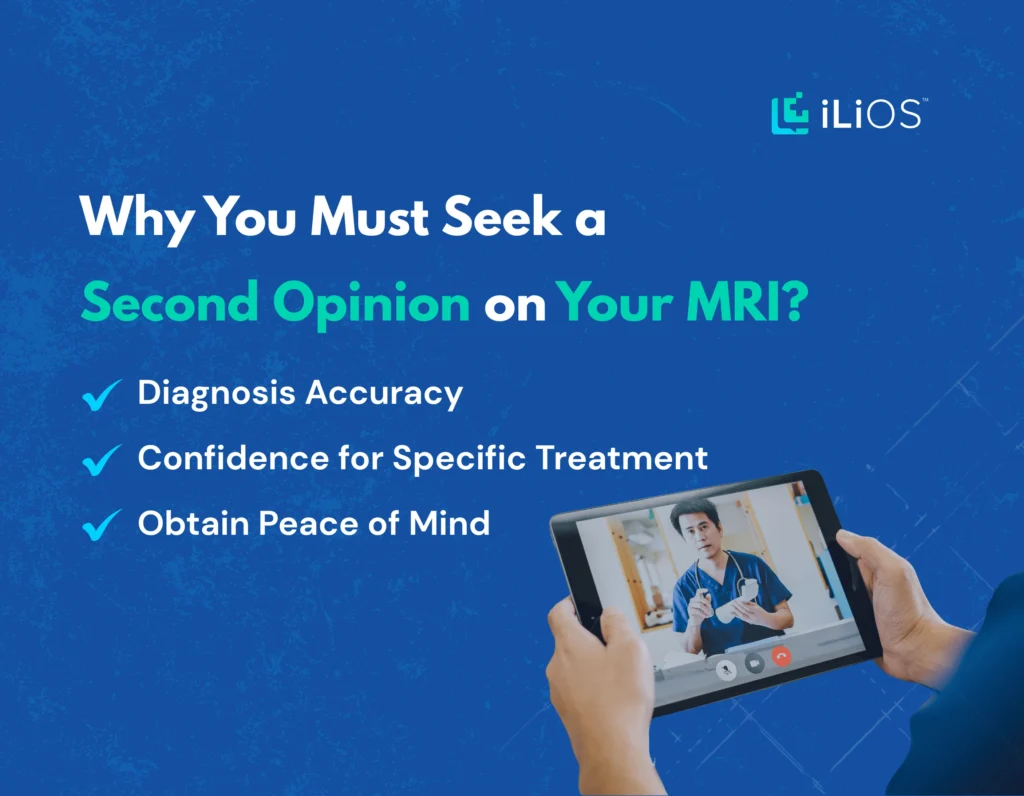Magnetic Resonance Imaging (MRI) scans are a valuable diagnostic tool, but due to the inherent features of MRI, differences in interpretation by experienced radiologists can still occur. If you have received MRI results that are ambiguous, life-altering or simply unexpected, obtaining a second opinion on MRI may give you clarity and diminish the chance of influencing your care in a way in which you do not desire.
Well, the good news is that with modern technology and specialized services, patients can obtain an MRI second opinion online within 24 to 48 hours. Yes, you read it right! This blog will guide you through the importance of a second opinion, potential risks of relying solely on the initial report, and a detailed step-by-step process for obtaining an expert review on a second MRI opinion.
Why You Must Seek a Second Opinion on Your MRI?

Seeking a second opinion for radiology report can feel like a daunting task, but what if the first interpretation isn’t correct? Seeking a second opinion for your MRI is not only for peace of mind, but also to ensure an accurate interpretation, an informed decision about your health, and possibly a diagnosis to examine before beginning treatment.
1. Diagnosis Accuracy
- Some studies show that up to 30% of imaging reports can have inconsistencies or errors when being interpreted by radiologists during complex cases or advanced modalities like MRI or CT scans.
- Yet, a second opinion can confirm your diagnosis, disclose prognosis, reflect significant changes in treatment in 10% – 62% of cases, ensuring you are acted upon with the correct information.
2. Confidence for Specific Treatment
- MRI interpretations frequently dictate significant decisions such as medication, surgery, or monitoring.
- Get second opinion radiology to avoid unnecessary processes, ensure you are on the right treatment plan and offer reassurance before making life-changing choices.
3. Obtain Peace of Mind
- Stress can arise when you’re uncertain about your health. Patients are reassured by knowing that another expert has evaluated their MRI, and takes away some of the uncertainty in deciding what to do next.
Key Risks of Not Getting a Second Opinion on MRI
You cannot rely on an initial (first) interpretation of the MRI to start treatment – you could, for example, be delayed from treatment, misdiagnosed or undergo unnecessary surgery or medical interventions.
A second opinion or fast MRI report review that is expedited is an important safety mechanism to ensure accuracy. When your health is aligned, double-checking is not just a powerful decision but essential. Moreover, studies have highlighted that 92% of patients who received a second opinion on MRI reports observed different results and ultimately experienced changes in their treatment management plans. This means the initial treatment recommendation was incorrect.
| Potential Risks | Key Impact |
| Unnecessary Processes | Surgeries or key interventions that could be avoided |
| Misdiagnosis | Inappropriate treatments, missed diagnosis or delayed care |
| Delayed Recovery | The extended treatment timeline due to the wrong initial report interpretation |
| Financial Cost | Expenses from avoidable treatment, surgery or repeat imaging |
When Should You Consider a Second Opinion for MRI?
- Patients facing invasive treatment or surgery based on MRI outcomes.
- Anyone with a complex, severe or rare diagnosis.
- When the MRI findings are confusing, unexpected, or contradictory.
- If you have persistent symptoms despite continual treatment.
- When you want confirmation before making a big decision regarding health.
How to Get a Second Opinion on Your MRI Within 48 Hours?

Are you stressed about your MRI results and need clarity fast? If you want a second opinion MRI 48 hours, you could use some online radiology services or telehealth options to get your results back in less than 48 hours! It does not matter if you have a diagnosis, or are just looking for some peace of mind, a second opinion provided by a specialist will give you clarity and avoid unnecessary (and costly) treatments.
Step 1: Get Your MRI Images and Reports
- Contact the imaging centre, hospital or clinic you had the scan done at.
- Then, request a digital copy of your MRI images in DICOM format and the original radiology report.
- Remember, most centres can offer reports on CD< USB drive or through secured online download.
Step 2: Select a Reputable Second Opinion Service
Factors to Look for:
- Sub-specialized radiologists (experts in body part or condition being evaluated)
- HIPAA-compliant secure upload and communication.
- Quick turnaround (24–48 hours).
- Valuable viewpoint for video consultations and written reports (if needed).
Step 3: Upload MRI and Medical Information
- Leverage the secure portal to upload MRI for second opinion via DICOM images and other relevant medical documents (clinical notes or previous reports).
- Complete all questionnaires regarding your symptoms, specific health concerns, and medical history.
Step 4: Acquire Expert Review and Reports
- Get an expert review when your case is matched with a radiologist specializing in your condition or body part.
- An expert conducts a thorough review by using advanced imaging tools and protocols accurately.
- Many radiologists second opinion service provides annotated images that are clear and include explanations in layman’s language.
Step 5: Receive and Review Your Second Opinion
- You will eventually receive a formal report with labeled images 24 to 48 hours after submitting.
- To discuss your report, results, and treatment options with specific services, you can arrange a video consultation with the radiologist.
- Talk about your second opinion with a specialist or your primary care physician to speed up your treatment plan.
Tips to Get a Fast Second Opinion on MRI Process
- Collect Relevant Records: Involve previous imaging, concise medical history and reports.
- Make Use of Clear File Labeling: Give your files a name, date of birth, and scan date for easy identification.
- Ask Specific Questions: If you have particular concerns, list them for the reviewing radiologists.
- Check the Provider’s Credentials: Ensure that your reviewer is a board-certified, sub-specialized radiologist.
- Track Your Email: Providers will contact you for clarification or to deliver the MRI report, and respond quickly for faster turnaround.
Real-World Impact: Why Quick Second Opinion Matters
A quick second opinion can be life-changing for individuals! For instance, in gynecologic oncology, second opinion MRI interpretation by sub-specialists changed patient management in 20.0% to 21.5% of cases.
Moreover, a study reported that at least 50% of spine surgeries were reduced as patients sought a second opinion after reviewing their MRI reports. Prompt access to expert review means that you can make essential decisions without any unnecessary delay in the treatment or undergoing unnecessary surgeries.
Conclusion
These days, getting a second opinion on MRI is fast and easy! Thanks to digital images, secure website uploads, and our extensive network of subspeciality radiologists, you can obtain comprehensive expert opinions within 48 hours!
Responsible providers probably use secure, encrypted, and HIPAA-compliant systems to ensure your privacy during the uploading, reviewing, and communicating steps.
1. Is Getting a Second Opinion a Costly Process?
Cost may vary by provider; however, there are many affordable services compared to the potential cost of unnecessary procedures or misdiagnosis. In fact, some insurance products may reimburse for second opinions; find out if your provider covers this.
2. Will My Treatment Be Postponed If I Seek a Second Opinion?
Not always! You can obtain a second opinion on your health within 48 hours without putting off your well-being, thanks to faster turnaround services for MRI reports.
3. Is My MRI Report Data Secure?
Responsible providers probably use secure, encrypted, HIPAA-compliant systems to ensure your privacy during the uploading, assessing, and communicating aspects.
4. What If My Second Opinion Differs from the First Report Results?
Differences in opinion may occur, especially in complex cases. In such scenarios, you can consult your doctor and seek a third-opinion or ask for a multidisciplinary review.



